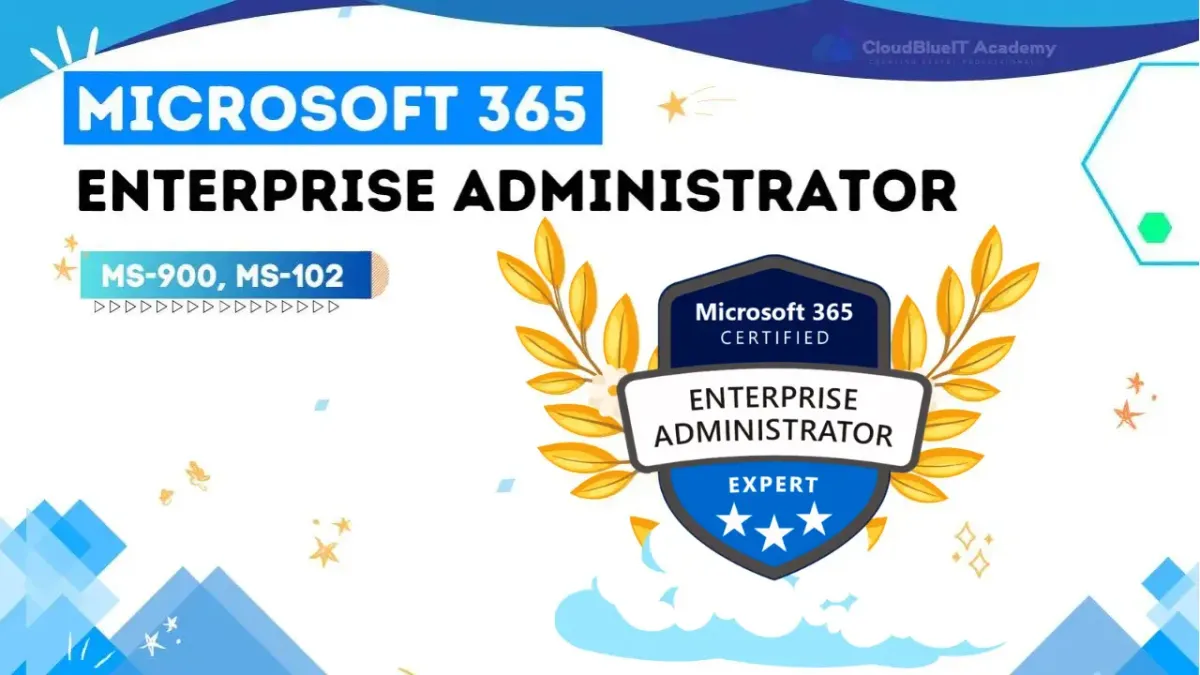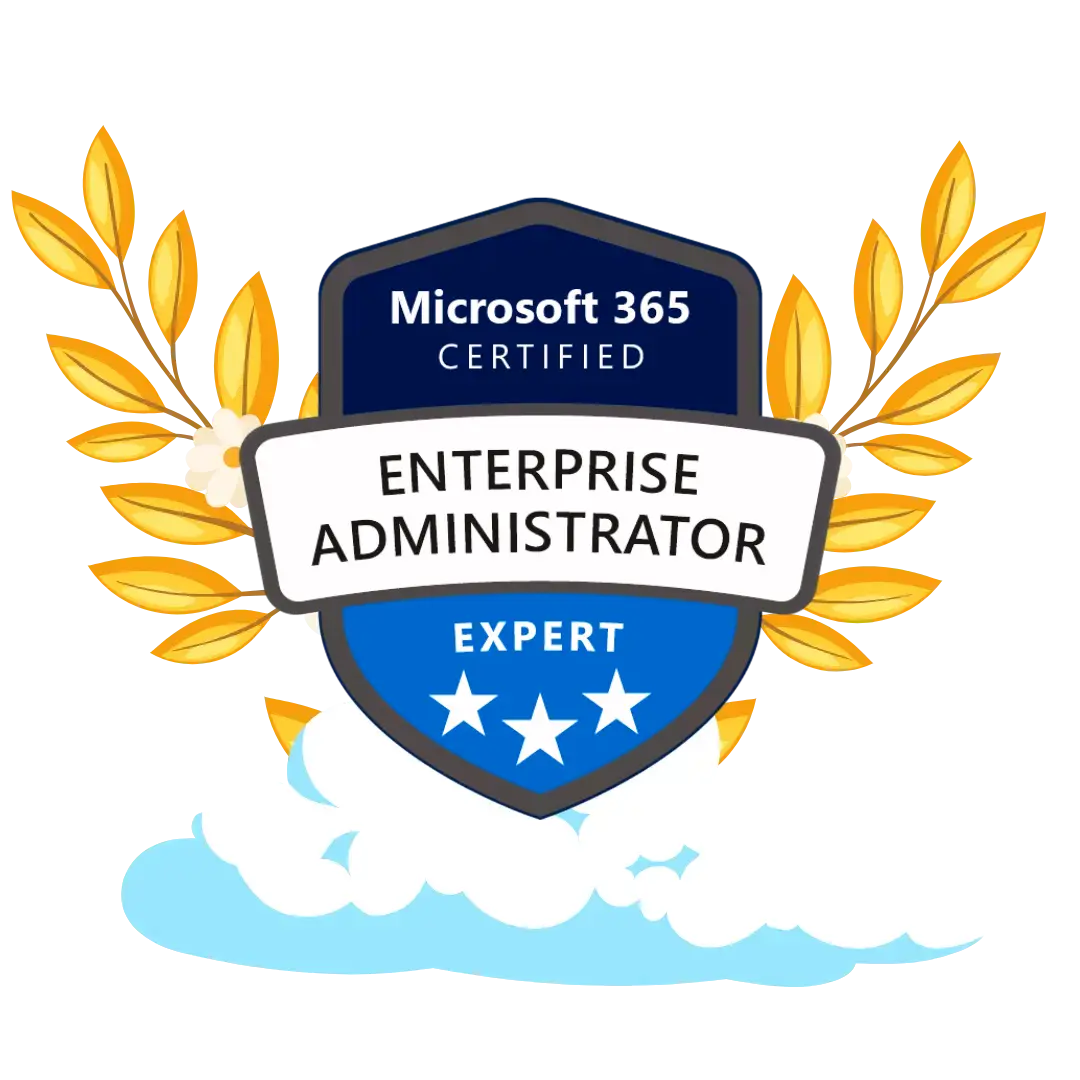Microsoft 365 Enterprise Administrator MS-900, MS-102

About Course
Learn implementing and Managing Microsoft 365 Services, cloud apps, collaboration solutions and Identity management
Course Overview
Instructor-Led online live training course that focuses on the cloud fundamentals, Microsoft 365 platform and services. Learn the Microsoft 365 product features, such as the Office application suite, OneDrive, SharePoint, Exchange Online, yammer and Azure Active Directory. Learn how to set up and manage user accounts, security measures, and more.
This course is ideal for new and existing system administrators of Microsoft 365 who want to gain an understanding of the different features and functions available.
As Microsoft 365 administrators deploy and manage Microsoft 365 tenant-level implementation and administration of cloud and hybrid environments. Administrators work with architects and other administrators responsible for workloads, infrastructure, identity, security, compliance, endpoints, and applications.
-
Topics Covered :
Module 1: Cloud Concepts and Microsoft Cloud Offerings
- Principles of cloud computing
- Benefits of and considerations for using cloud, hybrid, or on-premises services
- Factors that drive organizations to move to the cloud
Module 2: Overview of Microsoft 365 and Licensing
- Overview of Microsoft 365
- Describe Office 365, Microsoft 365, and Windows 365.
- Hybrid working strategies, flexible working strategies, and frontline workers
- Pricing model for Microsoft cloud services
- Describe the available base licensing and management options
Module 3: Creating Microsoft 365 tenant and Settings
- Creating Microsoft 365 tenant
- Microsoft 365 Admin Center
- Configuring Organization settings
- Billing and License management options including billing payment methods
- Microsoft 365 User portal and settings
Module 4: Microsoft 365 business management capabilities
- Manage your business with Microsoft 365
- Compare the capabilities of Windows 365 and Azure Virtual Desktop
- Deployment and release models for Windows-as-a-Service (WaaS)
- Deployment and servicing methods for Microsoft 365 apps
- Simplify device management with Microsoft Endpoint Manager
- Get more done and stay secure with Windows 10
Module 5: Identity and Access management in Microsoft 365
- Cloud identity, on-premises identity, and hybrid identity concepts
- Azure Active Directory and Azure Identity
- Manage user accounts and licenses in Microsoft 365
- Create and manage guest users
- Manage groups in Microsoft 365
Module 6: Plan and implement identity synchronization
- Explore identity synchronization
- Plan for Azure AD Connect implementation
- Configuring Custom Domain
- Implement Azure AD Connect
- Manage synchronized identities
- Monitor synchronization by using Azure AD Connect Health
- Troubleshoot synchronization, including Azure AD Connect and Azure AD Connect cloud sync
Module 7: Productivity solutions in Microsoft 365
- Microsoft 365 Apps including Word, Excel, PowerPoint, Outlook, and OneNote
- Work management capabilities in Microsoft 365 including Project, Planner, Bookings, and ToDo (Tasks)
- Deploy Microsoft 365 Apps
Module 8: Collaboration solutions in Microsoft 365-I
- Collaboration capabilities in Microsoft 365
- Business class email and calendaring solutions with Microsoft Exchange Online
- Managing Exchange Online recipients and permissions
Module 9: Managing SharePoint Online and OneDrive
- Overview of SharePoint Online
- Creating and Managing SharePoint site collections
- Managing SharePoint online settings
- Managing OneDrive for Business
Module 10: Managing Microsoft 365 Yammer and Teams
- Managing Yammer for Enterprise
- Overview of Microsoft 365 Teams
- Creating and Managing Microsoft Teams
- Managing Microsoft Teams Policies and settings
Module 11: Implement and manage authentication
- Implement and manage authentication methods, including Windows Hello for Business, password less, tokens, and the Microsoft Authenticator app
- Implement and manage self-service password reset (SSPR)
- Implement and manage Azure AD Password Protection
- Implement and manage multi-factor authentication (MFA)
- Investigate and resolve authentication issues
Module 12: Implement and manage secure access
- Configuring Roles with administrative access
- Manage delegation by using administrative units
- Implement privileged identity management for Azure AD roles
- Implement and manage Azure AD Identity Protection
- Conditional access
Module 13: Security, Privacy, and Trust in Microsoft 365
- Security principles for Microsoft 365
- Threat protection solutions in Microsoft 365
- Microsoft Secure Score benefits and capabilities
- Microsoft’s privacy principles and Management
- Service Trust portal – data residency to ensure regulatory compliance.
Module 14: Compliance solutions in Microsoft 365
- Microsoft 365 Compliance Manager
- Compliance Scores, and the benefits that they can provide to an organization
- Information protection, governance options and data loss prevention (DLP)
- Insider risk management solutions
- Auditing and eDiscovery solutions
Module 15: Reports & analytics capabilities in Microsoft 365
- Describe the capabilities of Viva Insights
- Reports available in the Microsoft 365 Admin center
- Reports available in the Microsoft 365 Admin center and other admin centers
Module 16: Microsoft 365 Service lifecycle and Support
- Private, public preview, and general availability (GA) options
- Service level agreements (SLAs)
- Microsoft product support and service improvements
- Microsoft 365 Roadmap portal
Module 17: Monitoring and Troubleshooting Microsoft 365
- Monitoring Microsoft 365 service health
- Troubleshooting Microsoft 365
- Managing Microsoft 365 users and groups with Windows PowerShell
Frequently Asked Questions
What is the role of a Microsoft 365 Enterprise Administrator?
A Microsoft 365 Enterprise Administrator manages and optimizes an organization’s Microsoft 365 environment, ensuring smooth operations, security, and collaboration across the suite’s applications.
How can I become a Microsoft 365 Enterprise Administrator?
To become a Microsoft 365 Enterprise Administrator, acquire the necessary skills and certifications, such as MS-900 and MS-102, which validate your expertise in managing and optimizing the suite.
What are the benefits of the MS-900 certification?
The MS-900 certification establishes a foundational understanding of Microsoft 365, enhancing your credibility and paving the way for more advanced certifications and career opportunities.
Is hands-on experience necessary for success as a Microsoft 365 Enterprise Administrator?
Yes, hands-on experience is crucial for understanding the practical aspects of managing Microsoft 365 services effectively. Practice in a sandbox environment or through real-world scenarios to gain valuable experience.
How can I stay updated with the latest Microsoft 365 features and updates?
Microsoft provides official documentation, blogs, and community forums to stay informed about the latest features, updates, and best practices within the Microsoft 365 ecosystem.
What are the recommended best practices for securing Microsoft 365?
Implementing multi-factor authentication, data loss prevention policies, and threat protection measures are some of the recommended best practices to ensure security within Microsoft 365.
Course By

Narayana B S L
Target Audience
Audience : Beginner to Intermediate
Course Benefits
- Duration : 2 Weeks
- Hands-on Labs
- Course Materials : Provided
- Recording Videos : Provided
- Course Completion Certificate : provided
- Post course completion support : Provided
February 19th
10.30am to 12.00 IST

